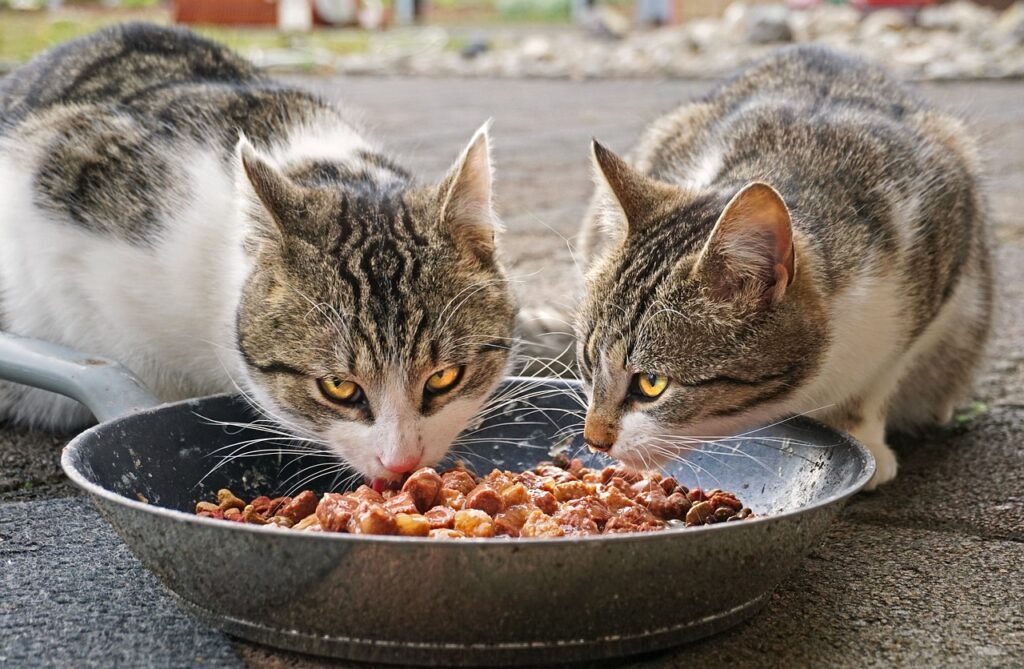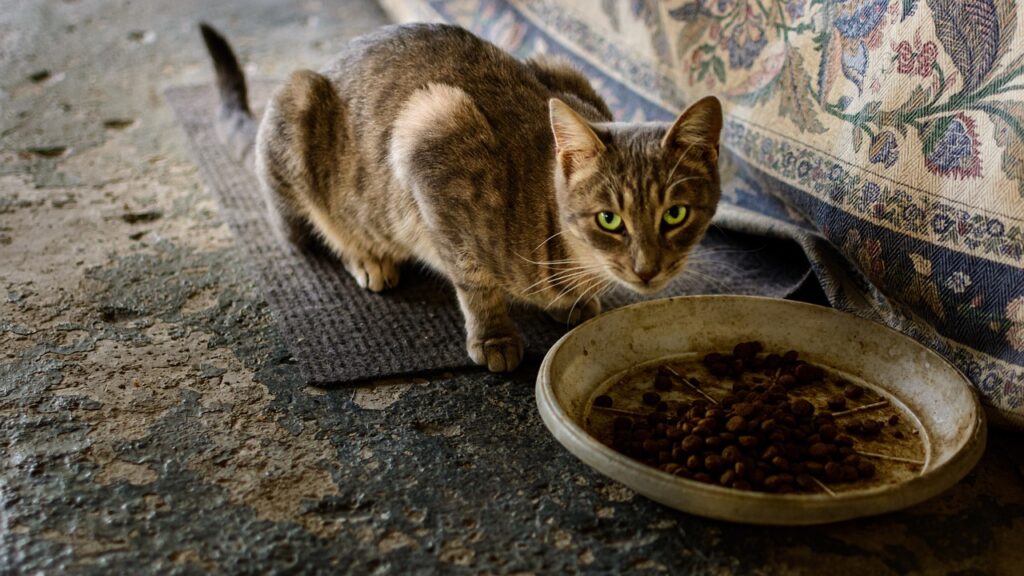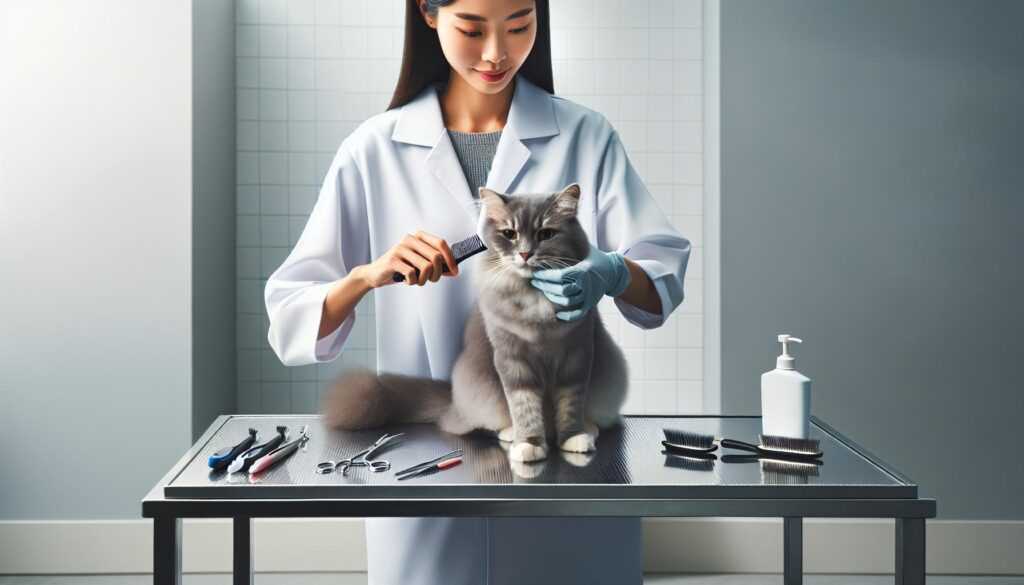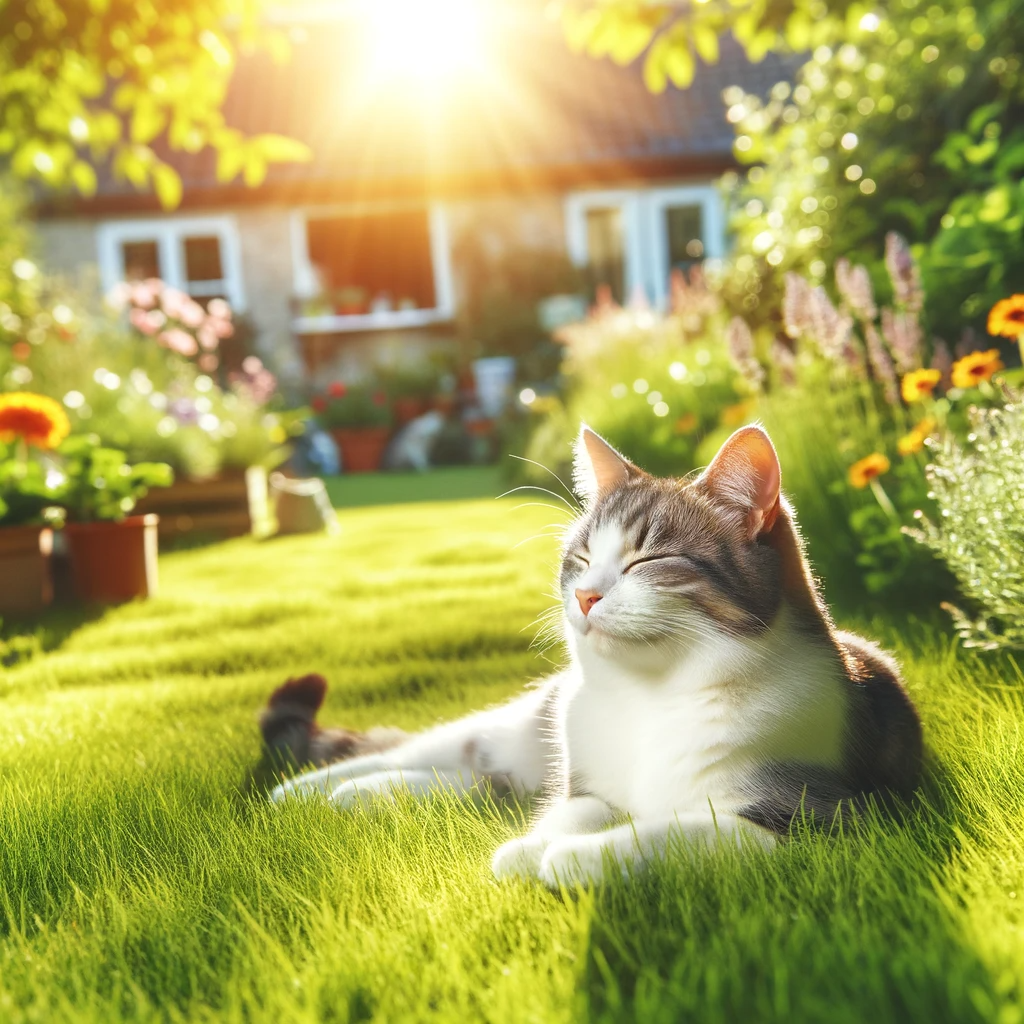Nourishing your feline companion involves more than just filling their bowl. Understanding your cat’s food is crucial in ensuring they receive the essential nutrients necessary for a healthy and happy life. Let’s delve into the world of cat food, exploring various options and the crucial role nutrition plays in your cat’s well-being.

Why You Need to Understand Your Cat’s Food Needs
Cats are obligate carnivores, meaning their bodies require animal protein for survival. This protein is essential for building and maintaining muscle, developing a healthy coat, and supporting their immune system. Additionally, they need specific vitamins and minerals for optimal health.
Navigating the Cat Food Aisle
Your local pet store offers a vast array of cat food options, each with its own advantages and considerations:
- Dry Food (Kibble): Convenient and budget-friendly, kibble provides a source of fiber and helps maintain dental health through chewing. Look for brands with high-quality protein sources listed as the first few ingredients. Prices range from $10-$50 per 10lbs bag depending on brand and quality.
- Wet Food (Canned food): Generally higher in moisture content, which is crucial for hydration, especially in cats who don’t drink much water. Wet food often appeals to cats with finicky palates. Prices start around $1 per can and can go up depending on brand and ingredients.
- Raw Food: Mimicking a cat’s natural diet, raw food typically consists of uncooked meat, bones, organs, and some vegetables. This option requires careful research and preparation to ensure a balanced diet and prevent bacterial contamination. Costs can vary greatly depending on the source and ingredients, but expect to pay $3-$10 per pound.
While enticing, preparing homemade cat food requires extensive research and consultation with a veterinarian to ensure it meets all your cat’s nutritional needs. Improperly formulated diets can lead to deficiencies and health issues.
Nutritional Benefits and How They Help Your Cat
- Protein: Crucial for building and maintaining muscle mass, supporting a healthy coat, and promoting a strong immune system.
- Taurine: An essential amino acid that supports healthy vision, heart function, and digestion.
- Fatty Acids: Omega-3 and omega-6 fatty acids contribute to healthy skin and coat, cognitive function, and joint health.
- Vitamins and Minerals: Essential for various bodily functions, including bone development, energy production, and nervous system health.
Choosing the Right Food for Your Cat:

Several factors influence which food is best for your feline friend:
- Age: Kittens need a higher calorie diet than adult cats, while senior cats may benefit from food formulated for their specific needs.
- Health Conditions: Cats with specific health conditions, like allergies or kidney disease, may require specialized diets.
- Activity Level: Highly active cats might need more calories than their low-activity counterparts.
Always consult your veterinarian when choosing a new food for your cat, especially if they have any underlying health concerns. They can guide you based on your cat’s individual needs and recommend specific brands or formulations.
Remember: Food is fuel for your cat’s amazing adventures. By understanding their nutritional needs and making informed choices, you can ensure they have the energy, strength, and overall well-being to thrive and live their best feline lives.tunesharemore_vert
Frequently Asked Questions
What makes cats obligate carnivores?
Cats are obligate carnivores, meaning their bodies are biologically designed to require animal protein for survival. Unlike omnivores, cats cannot synthesize certain essential nutrients from plant sources alone. Animal protein is crucial for building and maintaining muscle mass, developing a healthy coat, supporting their immune system, and providing essential amino acids like taurine that cats cannot produce themselves.
What’s the difference between dry food and wet food for cats?
Dry food (kibble) is convenient, budget-friendly ($10-$50 per 10lbs bag), provides fiber, and helps maintain dental health through chewing. Wet food (canned) is higher in moisture content, which is crucial for hydration, especially for cats who don’t drink enough water. Wet food typically appeals to finicky eaters and starts around $1 per can. Many veterinarians recommend a combination of both for balanced nutrition and adequate hydration.
Is raw food diet safe for cats?
Raw food diets mimic a cat’s natural diet and typically consist of uncooked meat, bones, organs, and some vegetables. While some cat owners prefer this approach, it requires careful research, proper preparation, and veterinary consultation to ensure nutritional balance and prevent bacterial contamination like Salmonella or E. coli. Costs range from $3-$10 per pound, and improper handling can pose health risks to both cats and humans.
Can I make homemade cat food?
While homemade cat food is possible, it requires extensive research and mandatory consultation with a veterinarian or veterinary nutritionist. Cats have very specific nutritional requirements, and improperly formulated diets can lead to serious deficiencies (especially taurine, vitamin A, and arachidonic acid) and long-term health issues. If you choose this route, your vet can help create a balanced recipe that meets all nutritional needs.
What is taurine, and why do cats need it?
Taurine is an essential amino acid that cats cannot produce in sufficient quantities on their own. It’s critical for healthy vision, proper heart function (preventing dilated cardiomyopathy), digestion, and reproductive health. Taurine deficiency can lead to serious health problems, including blindness and heart disease. This is why cats require animal-based protein sources, as plant proteins don’t contain adequate taurine.
How do I choose the right food for my cat’s age?
Different life stages require different nutritional profiles. Kittens need higher-calorie, protein-rich food to support rapid growth and development. Adult cats (1-7 years) need balanced maintenance diets to maintain a healthy weight and muscle mass. Senior cats (7+ years) may benefit from food formulated for their specific needs, often with fewer calories, joint support supplements, and easier-to-digest proteins. Always transition gradually when changing foods.
What role do omega fatty acids play in cat nutrition?
Omega-3 and omega-6 fatty acids are essential for multiple aspects of cat health. They contribute to healthy skin and a shiny coat, support cognitive function (especially important for senior cats), promote joint health, reduce inflammation, and support cardiovascular health. Cats cannot synthesize these fatty acids efficiently, so they must obtain them from their diet, typically from fish oils or certain meat sources.
How does my cat’s activity level affect their food needs?
Highly active cats, such as young cats or those with outdoor access, burn more calories and may require larger portions or higher-calorie food to maintain healthy body weight. Indoor or less active cats need fewer calories to prevent obesity. Adjust portion sizes based on your cat’s body condition score—you should be able to feel their ribs without excess fat covering. Your veterinarian can help determine the appropriate daily caloric intake.
Should I consult a vet before changing my cat’s diet?
Absolutely. Your veterinarian should always be consulted when choosing or changing your cat’s food, especially if your cat has underlying health conditions like kidney disease, diabetes, allergies, or gastrointestinal issues. Vets can recommend specific brands or formulations tailored to your cat’s individual needs, age, health status, and lifestyle. They can also help you properly transition between foods to avoid digestive upset.
What should I look for on cat food labels?
When selecting cat food, look for high-quality animal protein sources (chicken, turkey, fish, beef) listed as the first few ingredients. Avoid foods where grains or by-products are the primary ingredients. Check for AAFCO (Association of American Feed Control Officials) certification, which ensures the food meets minimum nutritional standards. Look for named protein sources rather than generic terms like “meat meal”, and ensure taurine is listed in the guaranteed analysis.
{ “@context”: “https://schema.org”, “@type”: “FAQPage”, “mainEntity”: [ { “@type”: “Question”, “name”: “What makes cats obligate carnivores?”, “acceptedAnswer”: { “@type”: “Answer”, “text”: “Cats are obligate carnivores, meaning their bodies are biologically designed to require animal protein for survival. Unlike omnivores, cats cannot synthesize certain essential nutrients from plant sources alone. Animal protein is crucial for building and maintaining muscle mass, developing a healthy coat, supporting their immune system, and providing essential amino acids like taurine that cats cannot produce themselves.” } }, { “@type”: “Question”, “name”: “What’s the difference between dry food and wet food for cats?”, “acceptedAnswer”: { “@type”: “Answer”, “text”: “Dry food (kibble) is convenient, budget-friendly ($10-$50 per 10lbs bag), provides fiber, and helps maintain dental health through chewing. Wet food (canned) is higher in moisture content, which is crucial for hydration, especially for cats who don’t drink enough water. Wet food typically appeals to finicky eaters and starts around $1 per can. Many veterinarians recommend a combination of both for balanced nutrition and adequate hydration.” } }, { “@type”: “Question”, “name”: “Is raw food diet safe for cats?”, “acceptedAnswer”: { “@type”: “Answer”, “text”: “Raw food diets mimic a cat’s natural diet and typically consist of uncooked meat, bones, organs, and some vegetables. While some cat owners prefer this approach, it requires careful research, proper preparation, and veterinary consultation to ensure nutritional balance and prevent bacterial contamination like Salmonella or E. coli. Costs range from $3-$10 per pound, and improper handling can pose health risks to both cats and humans.” } }, { “@type”: “Question”, “name”: “Can I make homemade cat food?”, “acceptedAnswer”: { “@type”: “Answer”, “text”: “While homemade cat food is possible, it requires extensive research and mandatory consultation with a veterinarian or veterinary nutritionist. Cats have very specific nutritional requirements, and improperly formulated diets can lead to serious deficiencies (especially taurine, vitamin A, and arachidonic acid) and long-term health issues. If you choose this route, your vet can help create a balanced recipe that meets all nutritional needs.” } }, { “@type”: “Question”, “name”: “What is taurine and why do cats need it?”, “acceptedAnswer”: { “@type”: “Answer”, “text”: “Taurine is an essential amino acid that cats cannot produce in sufficient quantities on their own. It’s critical for healthy vision, proper heart function (preventing dilated cardiomyopathy), digestion, and reproductive health. Taurine deficiency can lead to serious health problems including blindness and heart disease. This is why cats require animal-based protein sources, as plant proteins don’t contain adequate taurine.” } }, { “@type”: “Question”, “name”: “How do I choose the right food for my cat’s age?”, “acceptedAnswer”: { “@type”: “Answer”, “text”: “Different life stages require different nutritional profiles. Kittens need higher calorie, protein-rich food to support rapid growth and development. Adult cats (1-7 years) need balanced maintenance diets to maintain healthy weight and muscle mass. Senior cats (7+ years) may benefit from food formulated for their specific needs, often with fewer calories, joint support supplements, and easier-to-digest proteins. Always transition gradually when changing foods.” } }, { “@type”: “Question”, “name”: “What role do omega fatty acids play in cat nutrition?”, “acceptedAnswer”: { “@type”: “Answer”, “text”: “Omega-3 and omega-6 fatty acids are essential for multiple aspects of cat health. They contribute to healthy skin and a shiny coat, support cognitive function (especially important for senior cats), promote joint health, reduce inflammation, and support cardiovascular health. Cats cannot synthesize these fatty acids efficiently, so they must obtain them from their diet, typically from fish oils or certain meat sources.” } }, { “@type”: “Question”, “name”: “How does my cat’s activity level affect their food needs?”, “acceptedAnswer”: { “@type”: “Answer”, “text”: “Highly active cats, such as young cats or those with outdoor access, burn more calories and may require larger portions or higher-calorie food to maintain healthy body weight. Indoor or less active cats need fewer calories to prevent obesity. Adjust portion sizes based on your cat’s body condition score—you should be able to feel their ribs without excess fat covering. Your veterinarian can help determine the appropriate daily caloric intake.” } }, { “@type”: “Question”, “name”: “Should I consult a vet before changing my cat’s diet?”, “acceptedAnswer”: { “@type”: “Answer”, “text”: “Absolutely. Your veterinarian should always be consulted when choosing or changing your cat’s food, especially if your cat has underlying health conditions like kidney disease, diabetes, allergies, or gastrointestinal issues. Vets can recommend specific brands or formulations tailored to your cat’s individual needs, age, health status, and lifestyle. They can also help you properly transition between foods to avoid digestive upset.” } }, { “@type”: “Question”, “name”: “What should I look for on cat food labels?”, “acceptedAnswer”: { “@type”: “Answer”, “text”: “When selecting cat food, look for high-quality animal protein sources (chicken, turkey, fish, beef) listed as the first few ingredients. Avoid foods where grains or by-products are the primary ingredients. Check for AAFCO (Association of American Feed Control Officials) certification, which ensures the food meets minimum nutritional standards. Look for named protein sources rather than generic terms like ‘meat meal,’ and ensure taurine is listed in the guaranteed analysis.” } } ] }


